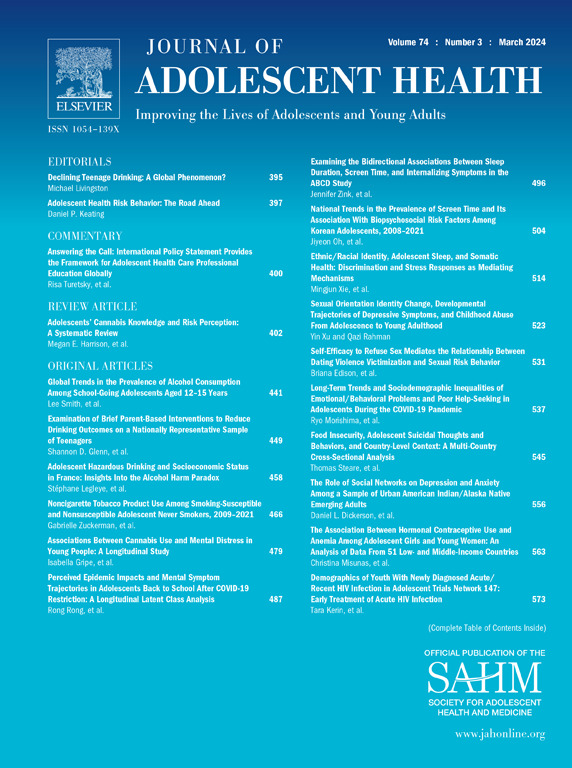出柜:在性少数妇女和性别多样化青年样本中,信息披露对性和生殖保健收据的影响。
IF 5.5
2区 医学
Q1 PEDIATRICS
引用次数: 0
摘要
目的:美国的性少数群体女性和性别多元化青年在性健康和生殖健康方面存在差异。我们评估了性伴侣类型、身份和吸引力是否与医疗保健信息披露有关,以及医疗保健信息披露是否与接受性保健和生殖保健有关。方法:103 名出生时被分配为女性的青年完成了一项行为健康调查。我们对数据进行了分析,以确定医疗保健信息披露是否与接受人类乳头瘤病毒(HPV)疫苗接种、人类免疫缺陷病毒(HIV)检测、避孕方法和长效可逆避孕药具有关。我们研究了性伴侣类型、身份和吸引力是否与医疗保健信息披露有关:在 103 名参与者中,超过半数自我认同为黑人(78%),至少有一名女性性伴侣(55%);14.6% 的参与者认同性别多元化。51.5%的人接种了 HPV 疫苗,52.4%的人在去年接受了 HIV 检测,38.8%的人采取了任何避孕方法,19.4%的人采取了长效可逆避孕措施。大多数青少年(63.1%)报告了医疗保健信息公开情况。医疗保健披露与接受性保健和生殖保健有关。只有男性伴侣、被认定为异性恋或不确定自己性身份的参与者不太可能公开自己的性取向以及接受 HIV 和 HPV 服务:讨论:减少医疗保健信息披露和接受医疗保健服务的障碍,对于消除所有青少年在性健康和生殖健康方面的差异至关重要。本文章由计算机程序翻译,如有差异,请以英文原文为准。
Being Out: Impact of Disclosure on Sexual and Reproductive Healthcare Receipt in a Sample of Sexual Minority Women and Gender Diverse Youth
Purpose
Sexual minority women and gender diverse youth in the United States experience disparities in sexual and reproductive health. We evaluated whether sexual partner type, identity, and attraction were associated with healthcare disclosure, and whether healthcare disclosure was associated with sexual and reproductive healthcare receipt in a sample of sexual minority and gender diverse youth aged 18–24 years assigned female at birth.
Methods
103 youth assigned female at birth completed a behavioral health survey. Data were analyzed to determine whether healthcare disclosure was associated with receipt of the human papillomavirus (HPV) vaccine, human immunodeficiency virus (HIV) testing, contraception method, and long-acting reversible contraception. We examined whether sexual partner type, identity, and attraction were associated with healthcare disclosure.
Results
Over half of the 103 participants self-identified as Black (78%) and had at least one female partner (55%); 14.6% identified as gender diverse. 51.5% received an HPV vaccine, 52.4% were HIV tested in the last year, 38.8% received any contraception method, and 19.4% received long-acting reversible contraception. The majority (63.1%) of youth reported healthcare disclosure. Healthcare disclosure was associated with sexual and reproductive healthcare receipt. Participants who had only male partners, identified as heterosexual or were unsure of their sexual identity were less likely to disclose their sexual orientation and receive HIV and HPV services.
Discussion
Reducing barriers to healthcare disclosure and care receipt will be critical to overcoming sexual and reproductive health disparities for all youth.
求助全文
通过发布文献求助,成功后即可免费获取论文全文。
去求助
来源期刊

Journal of Adolescent Health
医学-公共卫生、环境卫生与职业卫生
CiteScore
10.40
自引率
3.90%
发文量
526
审稿时长
46 days
期刊介绍:
The Journal of Adolescent Health is a scientific publication dedicated to enhancing the health and well-being of adolescents and young adults. Our Journal covers a broad range of research topics, spanning from the basic biological and behavioral sciences to public health and policy. We welcome a variety of contributions, including original research papers, concise reports, literature reviews, clinical case reports, opinion pieces, and letters to the editor. We encourage professionals from diverse disciplines such as Anthropology, Education, Ethics, Global Health, Health Services Research, Law, Medicine, Mental and Behavioral Health, Nursing, Nutrition, Psychology, Public Health and Policy, Social Work, Sociology, and Youth Development to share their expertise and contribute to our mission of promoting adolescent health. Moreover, we value the voices of young individuals, family and community members, and healthcare professionals, and encourage them to submit poetry, personal narratives, images, and other creative works that provide unique insights into the experiences of adolescents and young adults. By combining scientific peer-reviewed research with creative expressions, our Journal aims to create a comprehensive understanding of the challenges and opportunities in adolescent and young adult health.
 求助内容:
求助内容: 应助结果提醒方式:
应助结果提醒方式:


